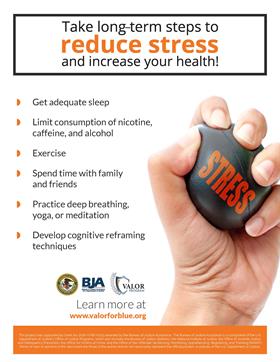.JPG)
Seven Ways to Alleviate Stress
June 5, 2020
Stress is an inherent part of life, especially in the field of law enforcement where we face uniquely demanding challenges on a day-to-day, and often moment-to-moment, basis. And while not all stress is “bad,” the constant, unrelenting activation of the fight or flight response can negatively impact our physical, mental, and emotional well-being and change the way we move through life.
When our bodies are unable to routinely discharge stress hormones, this stress accumulates. It begins inhibiting the body’s ability to heal and contributes to a host of chronic conditions such as heart disease, diabetes, high blood pressure, insomnia, fatigue, depression, anxiety, anger, inability to focus, poor memory, and lack of confidence.
While we will never be able to completely eliminate stress from our life or work (nor would we want to because we would miss out on a lot of fun stuff like roller coasters and rock climbing), there are purposeful actions that we can take to help alleviate it. Here are a few things to consider:
1. Get Some Sleep
Having spent a good chunk of my life as a law enforcement officer, I get it. This is not so easily done. Shift work is not conducive to keeping your sleep bank account full, and if you are really stressed out, your ability to sleep soundly is impaired. That being said, I would be remiss if I didn’t at least mention that getting regular, deep rest is the number one way our bodies release stress and reset.
If sleep is throwing you a curveball, try a few of these tips:
· Create a cool, dark environment as free from disruptions as possible.
· Do not eat a large meal or consume alcohol close to sleep time.
· Reduce your caffeine consumption if you can.
· Avoid media and activities that trigger the stress response close to sleep time.
· Consider using a sleep app to help you establish regular sleep habits, even if your shift schedule is regularly irregular. Regular sleep habits contribute to better quality sleep and better overall health.
· If you are having trouble falling asleep, find a meditation app, pop in your earbuds, press play, and allow a guided meditation called Yoga Nidra to escort you to sleep.
2. Get Moving
The discharge of excess stress hormones occurs naturally and normally with physical activity . . . think fighting or fleeing. This natural, built-in, evolutionary way of releasing stress makes exercise a great way to help balance your hormones. Regular exercise contributes to physical and mental fitness. Even five minutes of walking briskly, jumping up and down, or repeatedly shaking your hands and arms after a stressful event can burn up a bit of cortisol.
3. Find Your Happy Place
Ask yourself, “What relaxes me and creates feelings of safety and trust?” And then do that! Whether it is being out in nature, laughing your way through a comedy show, walking your dog, or simply spending the day playing ball with your kids, it is important for you to spend time in environments where you feel safe and with people who love, support, and nurture you. There is a reason this works—it stimulates the parasympathetic nervous system and elicits the relaxation response . . . the opposite of the stress response.
4. Bring in the Good Stuff
As law enforcement officers, it is easy to lose perspective about the good things in the world, seeing the entire planet as an unsafe and unfriendly place. It does feel that way sometimes, so it is important to set aside time to intentionally reorient your attention to the positive. Try beginning or ending your day with contemplating three things for which you are grateful. I say “contemplating” because I do not mean just listing them. Instead, bring them to your mind and heart and allow these feelings of gratitude to show up in your body. Grateful people have lower levels of stress and depression and are happier.
5. Take a Deep Breath
Seriously. Do it right now. Take a deep breath, feeling your lungs fully expand, then slowly exhale for the count of five. Repeating this several times sends a signal to your nervous system letting it know that it is time to settle down. Consider this a mini version of combat tactical breathing where you use controlled breathing to exert pressure on the diaphragm and vagus nerve, activating the relaxation response. We have all experienced rapid and shallow breathing amidst stress. Change your breath, change your mind!
6. Meditate Daily . . . Okay, Almost Daily
In my opinion, mindfulness meditation is a superpower! Especially for law enforcement because . . . drumroll . . . it mimics the restful state of sleep, giving your body another opportunity to release all of that accumulated stress. Just to be clear, I am not advocating sitting down and meditating in the middle of a stressful call. However, taking a few minutes before or after each shift to meditate is an excellent way to prevent the buildup of stress.
Meditating on a regular basis changes the physical structures of the brain in key areas associated with fear, anxiety, emotion regulation, attention, and executive functions such as decision making, problem-solving, and discernment. Consider the impact!
7. Do Not Go It Alone
Unfortunately, our ability to cope takes a big hit when we have accumulated stress. Often, we rely on maladaptive coping strategies like alcohol, drugs, isolation, and cynicism which tend to just make things worse. If you are not coping as well as you would like, talk to someone. Whether it is a friend, counselor, clergyperson, life partner, or work partner, the important thing is to reach out. And besides, the best way you can encourage others to do the same is to be their example in courage by asking for some backup.
In closing, recognize that stress will always be a part of life. We cannot avoid stressful situations, obviously, but we can avoid the long-term effects of chronic unhealthy stress if we are proactive.
The views and opinions expressed in this blog are those of the authors. They do not reflect the views or opinions of the U.S. Department of Justice.
Recommended Resources
Critical Incidents and Post-Traumatic Stress
In this episode, Chief David Flory (Retired), a lead instructor with the VALOR Officer Safety and Wellness Program, is...
View ResourceSurviving Organizational Stress
It is not uncommon to experience organizational stress. Many officers report, during our training, that they experience some...
View Resource


